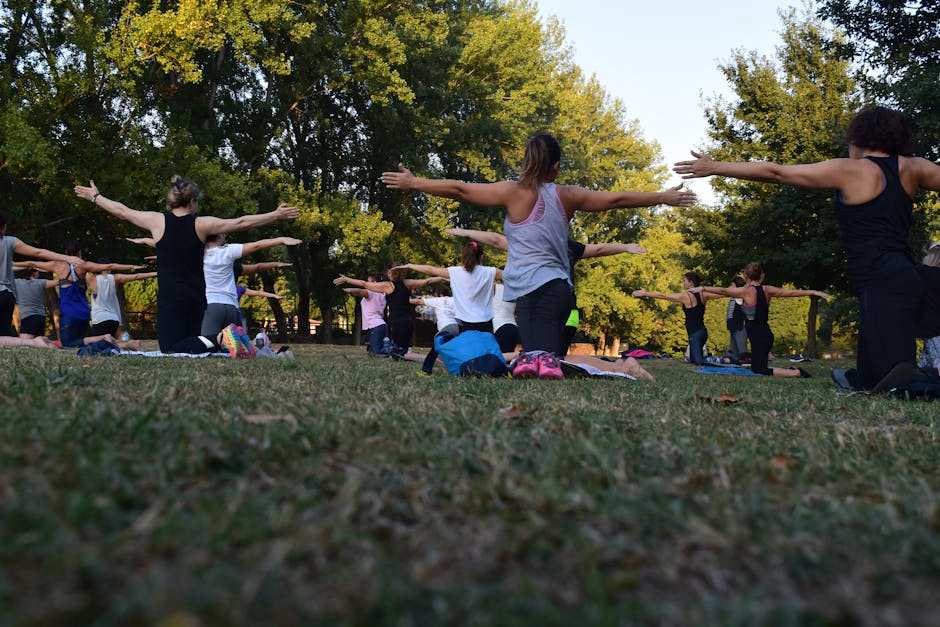How Do You Feel About Your Fitness Status?
Published by Rich Fawthrop in Fitness the 06/08/2023 at 22:21

Making health and fitness a priority in our lives is undoubtedly crucial, especially in today's fast-paced and demanding world. However, between work commitments, family responsibilities, and a multitude of other obligations, it can be challenging to find the time and motivation to focus on our physical well-being. As a result, many individuals find themselves feeling disconnected and dissatisfied with their current fitness status.
Regular exercise not only impacts our physical health but also plays a vital role in our mental and emotional well-being. It boosts our energy levels, improves our mood, reduces stress, helps us sleep better , and sharpens our focus. Despite being aware of these benefits, numerous people still struggle to incorporate fitness into their daily routine.
So, how do you feel about your fitness status? Do you find yourself wishing for more energy and strength to keep up with your daily tasks? Are you constantly battling the effects of stress or feeling burned out? Or perhaps you have specific fitness goals that you've been unable to achieve due to lack of time or motivation?
Acknowledging and addressing these feelings is the first step towards positive change . It's important to recognise that you're not alone in your struggles and that many others share similar experiences . With the right mindset and a few practical steps, you can transform your fitness status and improve your overall well-being.
In this blog post, we will explore different strategies to help you evaluate your fitness status and develop a personalised plan to achieve your goals. We will also discuss the importance of finding balance, setting realistic expectations, and seeking professional guidance when necessary. By implementing these strategies, you can embrace a healthier lifestyle and start feeling more confident and satisfied with your fitness journey.
Remember, it's never too late to make a change and prioritise your physical and mental health. With determination, perseverance, and a commitment to self-care, you can take control of your fitness status and experience the numerous benefits that come with it. So, let's dive in and discover the path towards a fitter, happier, and more fulfilling life.
Personal reflection:

I firmly believe that personal reflection plays a vital role in our journey towards improving our fitness levels. When it comes to my own attitude towards fitness, I am dedicated and committed to leading a healthy lifestyle. I prioritise regular exercise and make conscious choices about what I fuel my body with. However, like everyone else, I have my own ups and downs with maintaining a consistent fitness routine.
Currently, I would describe my fitness level as moderately active. While I engage in some form of physical activity on a regular basis, there are times when life gets busy , and I struggle to find the time and motivation to exercise as consistently as I would like. This inconsistency sometimes leaves me feeling frustrated and lacking the progress I desire.
Nevertheless, I continuously strive to find ways to incorporate movement and exercise into my daily routine. Whether it's taking the stairs instead of the elevator, going for a walk during my lunch break, or participating in fitness classes, I am always seeking opportunities to stay active.
Overall, my attitude towards fitness is one of determination and self-improvement. I am open to trying new forms of exercise and constantly learning about the best practices for maintaining a healthy lifestyle. While there may be hurdles along the way, I believe that personal reflection and the desire to enhance one's fitness are key to achieving long-term success.
Determining your fitness goals:

Setting realistic and specific fitness goals is crucial when it comes to tracking progress and achieving success in your fitness journey. Without clear goals, it can be challenging to stay motivated and keep yourself accountable. Here are a few reasons why determining your fitness goals is so important:
1. Provides Direction: Having a clear goal in mind gives you a sense of direction and purpose. It helps you stay focused and motivated on what you want to achieve. Whether it's losing weight, building muscle, or improving overall endurance, setting specific goals ensures that you're working towards something tangible .
2. Measures Progress: Setting specific goals allows you to track your progress effectively. Having a concrete target to aim for enables you to measure how far you've come and how close you are to achieving your goals. This sense of progress can boost your confidence and keep you motivated to continue pushing yourself.
3. Builds Accountability: When you set fitness goals, you create a sense of accountability for yourself. By sharing your goals with others, such as friends, family, or a fitness trainer, you create a support system that holds you accountable for your actions. Regularly updating them on your progress can help you stay on track and avoid slacking off.
4. Encourages Sustainable Habits: Setting realistic goals promotes the adoption of sustainable habits for a healthier lifestyle. When your goals are achievable and manageable, you're more likely to develop healthy habits that can be maintained long-term. This could include regular exercise routines , healthier eating habits, and proper rest and recovery.
5. Boosts Motivation: Having clear goals to work towards provides a constant source of motivation. As you see yourself progressing and getting closer to your goals, the sense of accomplishment can stimulate further motivation to push through challenges and overcome obstacles along the way.
When determining your fitness goals, it's essential to make them realistic and specific. Avoid setting vague goals such as "getting fit" or "losing weight." Instead, make them measurable, achievable, relevant, and time-bound (SMART goals). For example, setting a goal to run a 10k race in three months or to increase your weightlifting bench press by 10 pounds within six weeks .
By setting specific goals, you give yourself a clear roadmap for success, enabling you to track progress, stay accountable, and stay motivated on your fitness journey. Remember that everyone's fitness journey is unique, so set goals that align with your personal aspirations, capabilities, and timeframes.
Assessing your current fitness status:

Photo by Li Sun on Pexels
Assessing Your Current Fitness Status
Maintaining a healthy fitness level is crucial for overall well-being and productivity, both personally and professionally. Before embarking on any fitness journey, it's essential to assess your current fitness status accurately. Here are some tips and methods to help you evaluate your fitness level:
1. Fitness Trackers: Investing in a reliable fitness tracker can be an excellent tool for assessing your current fitness status. These wearable devices can provide comprehensive data such as heart rate, steps taken, calories burned, sleep quality, and even track specific exercises . By analysing these metrics, you can gain a better understanding of your overall fitness level and set realistic fitness goals.
2. Professional Consultation: Consulting with fitness professionals, such as personal trainers or fitness coaches, can be immensely beneficial. They have the expertise to evaluate your fitness level with tailored assessments and tests. These professionals can carry out tests like body composition analysis , endurance tests, flexibility assessments, and strength assessments. Their objective evaluation will provide you with a clear understanding of your strengths and areas that need improvement.
3. Self-Reflection: Take a moment to reflect on your own physical capabilities and limitations. Consider your level of cardiovascular endurance, strength, flexibility, and balance. Can you effortlessly climb multiple flights of stairs or perform basic exercises like push -ups or squats? Assessing how you feel during daily activities can give you valuable insights into your fitness status.
4. Milestones and Progress: Assessing your fitness status doesn't only mean focusing on where you are currently. Reflecting on your progress is equally significant. Look back at your fitness achievements and milestones in the past, such as completing a 5K run or reaching a certain weightlifting goal. Assessing how far you've come can boost your motivation and provide a clearer picture of your overall fitness level.
Remember, evaluating your fitness status is not meant to discourage or demotivate you. Instead, it should serve as a starting point to set goals and develop a tailored fitness plan that suits your needs. With a clear understanding of your current fitness level, you can make informed decisions and work towards a healthier and more active lifestyle.
Factors affecting your fitness status:

Factors Affecting Your Fitness Status:
Maintaining a healthy fitness level is influenced by a variety of factors, both internal and external. Understanding these factors can help you make informed decisions about your fitness routine and overall well-being. Let's explore the key factors that play a crucial role in determining your fitness status.
1. Genetics: Genetics contribute significantly to our physical attributes and capabilities. Factors such as metabolism, body type, and muscle composition are largely influenced by our genetic make-up. While genetics play a role in determining our baseline fitness, it's important to remember that they are not the sole determining factor. With the right lifestyle choices and exercise routine, individuals can overcome genetic limitations and improve their fitness status.
2. Lifestyle: Our daily habits and lifestyle choices also have a significant impact on our fitness status. Sedentary lifestyles, poor nutrition, lack of sleep, and high stress levels can negatively affect our overall well-being and fitness levels. On the other hand, maintaining an active lifestyle, eating a balanced diet, and getting enough rest can contribute to improved fitness outcomes. It's important to prioritise healthy habits and make conscious choices in our everyday lives.
3. Exercise Routine: The type, frequency, and intensity of exercise we engage in directly influence our fitness status. Regular physical activity, such as cardio exercises, strength training, and flexibility workouts, can improve cardiovascular health, build strength and endurance, and promote flexibility. Varying your exercise routine and incorporating different types of workouts can help prevent plateaus and maintain overall fitness. Consulting with a fitness professional can be helpful in designing a personalised exercise plan that suits your needs and goals.
4. Environmental Factors: The environment in which we live and work can affect our fitness levels. Factors such as access to recreational facilities, availability of healthy food options, and the level of air pollution can impact our ability to partake in physical activities and make healthy choices. While we may not have control over all environmental factors, being aware of their influence can guide us in making the best choices for our fitness.
In conclusion, your fitness status is influenced by a combination of genetic, lifestyle, exercise routine, and environmental factors. While some of these factors may be beyond our control, we can still make conscious choices to improve our fitness levels and overall well-being. By understanding these factors and taking proactive steps , you can set yourself on the path to achieving and maintaining a healthy and sustainable fitness status.
Embracing a positive mindset:

Maintaining a positive mindset is crucial when it comes to your fitness journey. Adopting a positive perspective not only boosts your motivation and commitment but also affects your overall well-being. Embracing a positive mindset allows you to approach your fitness goals with enthusiasm, making the process more enjoyable and fulfilling.
When you have a positive outlook, you are more likely to set realistic and achievable goals. Instead of fixating on unattainable ideals or comparing yourself to others, you understand that progress takes time. You know that every small step forward brings you closer to your ultimate objective.
Having a positive mindset also helps you overcome obstacles and setbacks. Inevitably, there will be days when you feel tired, unmotivated, or challenged. However, a positive mindset allows you to view these as temporary hurdles rather than insurmountable roadblocks. You can acknowledge the difficulties but remain focused on finding solutions and moving forward.
Furthermore, a positive mindset encourages self-compassion and self-acceptance. You understand that achieving optimal fitness does not come from berating yourself or engaging in negative self-talk. Instead, you acknowledge your current strengths and weaknesses, celebrating your progress while still working towards improvement . This self-compassion fosters a healthier relationship with yourself and promotes a sustainable approach to fitness.
Positive thinking extends beyond physical changes and permeates into your mental and emotional well-being. When you engage in regular exercise and maintain a positive mindset, your brain releases endorphins that can help alleviate stress, boost your mood, and improve cognitive function. This mental well-being translates into increased productivity and focus, benefiting not only your fitness journey but also your professional endeavours.
In conclusion, embracing a positive mindset is fundamental to your fitness journey. It not only propels you forward but also ensures a sustainable and enjoyable experience. By setting realistic goals, overcoming setbacks, practicing self-compassion, and benefiting your mental well-being, a positive mindset becomes a powerful tool in achieving and maintaining your desired level of fitness. So, start today by shifting your perspective and embracing the positivity that will fuel your fitness success.
Celebrating small victories:

It's easy to get caught up in the big picture when it comes to fitness - setting ambitious goals, dreaming of major transformations, and picturing what you'll look like when you've reached your ideal fitness level. And while these aspirations are important to keep you motivated, it's equally crucial to acknowledge and celebrate the small victories along the way.
Fitness is not an overnight success story; it's a journey filled with ups and downs, plateaus, and breakthroughs. By celebrating small achievements, we can stay motivated, boost our confidence, and maintain a positive mindset throughout our fitness endeavours.
So, what exactly do we mean by small victories? These can range from completing an extra rep in the gym, increasing the weight you lift, running a little bit further or faster than before, or even staying consistent with your workout routine for a week. The key is to recognise these accomplishments, no matter how insignificant they may seem, and take a moment to appreciate the progress you're making.
Celebrating small victories can have a tremendous impact on your overall well-being. It provides a sense of accomplishment and boosts self-confidence, reminding you that you have the power to overcome challenges and make positive changes in your life. By acknowledging these small wins, you create a cycle of motivation, pushing yourself to reach even bigger milestones .
Moreover, celebrating small victories helps to counteract the frustration that can arise from slow progress or setbacks. It serves as a reminder that every step forward, no matter how small, is still a step in the right direction. By focusing on what you've achieved rather than what you haven't, you can stay motivated and maintain a positive mindset, which is crucial for long-term success.
Appreciating and celebrating the small victories also cultivates a sense of gratitude for your body and its capabilities. Fitness is not just about physical changes; it's about building strength, stamina, and resilience. By recognising and honouring the little wins, you develop a deeper appreciation for what your body can do, embracing the journey rather than fixating solely on the outcome.
So, how can you celebrate these small accomplishments? It's entirely up to you and what resonates with you personally. It could be treating yourself to a new workout outfit, planning a relaxing day at the spa, or indulging in your favourite healthy meal. The important thing is to choose rewards that align with your values and make you feel proud of your progress.
In conclusion, celebrating small victories is crucial throughout your fitness journey. By acknowledging and appreciating even the smallest achievements, you can stay motivated, boost your confidence, and maintain a positive mindset. Remember, it's the combination of these small wins that ultimately leads to significant progress, so celebrate every step along the way towards your fitness goals.
Overcoming challenges:

The journey to achieving and maintaining optimal fitness levels can often be filled with many challenges. It's not uncommon for individuals to feel a lack of motivation or struggle with consistency in their fitness routine. However, by identifying these challenges and implementing effective strategies, it is possible to overcome them and reach your desired fitness status.
One of the most common challenges individuals face when it comes to their fitness journey is finding the motivation to exercise regularly. It's easy to feel demotivated, especially when progress seems slow or when facing obstacles such as time constraints or physical limitations. To combat this challenge, it's crucial to set clear and realistic goals that are personally meaningful. Whether it's improving overall health, achieving a specific weight loss target , or enhancing athletic performance, having a clear purpose can help drive your motivation. Additionally, finding an exercise routine that you enjoy and that aligns with your interests and preferences can make the journey more enjoyable and increase your chances of staying motivated in the long run. Consider exploring various workout options, such as group fitness classes, outdoor activities, or online workouts, to keep your exercise routine engaging and exciting.
Another hurdle many individuals face is consistency. It's easy to start a fitness routine with enthusiasm, only to gradually lose momentum over time. To overcome this challenge, establishing a structured schedule and creating a habit is crucial. Consistency can be fostered by setting aside specific times each week for exercise and treating them as non-negotiable commitments. Treating your fitness routine like any other important meeting or appointment helps prioritise your physical well-being. Furthermore, consider varying your workouts to keep them interesting and prevent boredom setting in. Cross-training, incorporating different types of exercises, and trying new activities can provide both physical and mental benefits, making it easier to stick with your fitness routine.
In addition to motivation and consistency, it is vital to address any mental or emotional barriers that may hinder progress. Many individuals struggle with negative self-talk or feelings of self-doubt, which can significantly impact their fitness journey. Practicing positive self-affirmations and surrounding yourself with a supportive network of friends, family, or like-minded individuals can help combat these mental obstacles. Additionally, seeking guidance from a fitness professional or personal trainer can provide valuable expertise, accountability, and encouragement to stay on track.
Overall, overcoming challenges in your fitness journey requires a combination of mindset, strategy, and perseverance. By identifying the common hurdles individuals face, such as finding motivation and staying consistent, and implementing effective strategies to combat them, you can pave the way towards achieving and maintaining your desired fitness status. Remember, progress may not always be linear, but with determination and a proactive approach, you can overcome these challenges and experience the long-term benefits of a healthy and active lifestyle.
Seeking support and accountability:

In the journey towards achieving your fitness goals, seeking support and accountability can make a significant difference in your progress and overall success. While embarking on a fitness journey might initially seem like a personal endeavour, involving others can have a profound impact on your motivation and commitment.
One of the key benefits of seeking support from friends, family, or fitness communities is the boost of motivation it provides. When we share our goals and aspirations with others, they become invested in our success. This creates a sense of accountability as we strive to meet the expectations we have set for ourselves and the expectations of those who support us.
Moreover, having a support system can help you overcome any hurdles or challenges you may face along the way. With the guidance and encouragement of others, you'll be more likely to push through tough times, stay consistent, and maintain a positive mindset. Fitness communities, for instance, often provide a wealth of resources, ranging from workout plans to nutrition tips, that can further support your fitness journey.
Additionally, surrounding yourself with like-minded individuals can create a sense of camaraderie and healthy competition. Engaging in fitness activities with others can spark friendly challenges and enable you to push yourself beyond your comfort zone. Experiencing the progress and accomplishments of others can serve as inspiration, motivating you to reach new heights in your own fitness journey.
Seeking support and accountability also allows for celebration of your achievements. Sharing your milestones and successes with others not only boosts your confidence but also fosters a positive social environment. Encouragement and recognition from friends, family, or fitness communities can enhance your overall sense of accomplishment and pride in your fitness journey.
To seek support and accountability, consider joining fitness-related groups or communities, both online and offline. Engage in conversations, share progress updates, and seek advice or guidance whenever necessary. Additionally, don't hesitate to reach out to friends or family members who share similar fitness goals or interests. Having someone to hold you accountable, workout with, or simply offer moral support can make a world of difference.
Remember, fitness is not solely an individual endeavour. By seeking support and accountability, you are opening yourself up to a network of like-minded individuals who can empower you to reach your full potential. Embrace the power of community and watch as it propels you towards a happier, healthier, and more fulfilled life.
